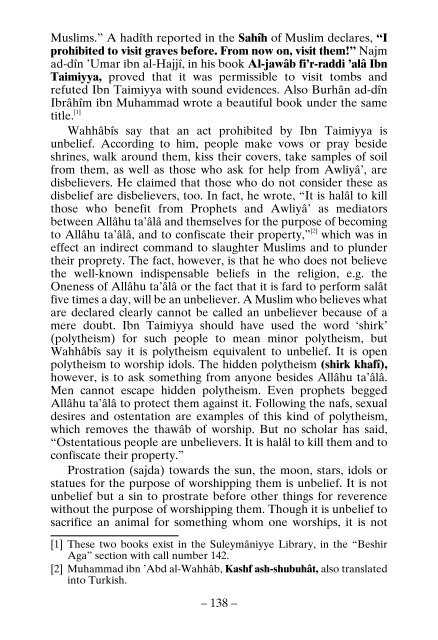Islams Reformers
The bigotry of the religion reformers or bigots of science who surfaced lately to blame all previous scholars, basic fundamental beliefs or practices
The bigotry of the religion reformers or bigots of science who surfaced lately to blame all previous scholars, basic fundamental beliefs or practices
You also want an ePaper? Increase the reach of your titles
YUMPU automatically turns print PDFs into web optimized ePapers that Google loves.
Muslims.” A hadîth reported in the Sahîh of Muslim declares, “I<br />
prohibited to visit graves before. From now on, visit them!” Najm<br />
ad-dîn ’Umar ibn al-Hajjî, in his book Al-jawâb fi’r-raddi ’alâ Ibn<br />
Taimiyya, proved that it was permissible to visit tombs and<br />
refuted Ibn Taimiyya with sound evidences. Also Burhân ad-dîn<br />
Ibrâhîm ibn Muhammad wrote a beautiful book under the same<br />
title. [1]<br />
Wahhâbîs say that an act prohibited by Ibn Taimiyya is<br />
unbelief. According to him, people make vows or pray beside<br />
shrines, walk around them, kiss their covers, take samples of soil<br />
from them, as well as those who ask for help from Awliyâ’, are<br />
disbelievers. He claimed that those who do not consider these as<br />
disbelief are disbelievers, too. In fact, he wrote, “It is halâl to kill<br />
those who benefit from Prophets and Awliyâ’ as mediators<br />
between Allâhu ta’âlâ and themselves for the purpose of becoming<br />
to Allâhu ta’âlâ, and to confiscate their property,” [2] which was in<br />
effect an indirect command to slaughter Muslims and to plunder<br />
their proprety. The fact, however, is that he who does not believe<br />
the well-known indispensable beliefs in the religion, e.g. the<br />
Oneness of Allâhu ta’âlâ or the fact that it is fard to perform salât<br />
five times a day, will be an unbeliever. A Muslim who believes what<br />
are declared clearly cannot be called an unbeliever because of a<br />
mere doubt. Ibn Taimiyya should have used the word ‘shirk’<br />
(polytheism) for such people to mean minor polytheism, but<br />
Wahhâbîs say it is polytheism equivalent to unbelief. It is open<br />
polytheism to worship idols. The hidden polytheism (shirk khafî),<br />
however, is to ask something from anyone besides Allâhu ta’âlâ.<br />
Men cannot escape hidden polytheism. Even prophets begged<br />
Allâhu ta’âlâ to protect them against it. Following the nafs, sexual<br />
desires and ostentation are examples of this kind of polytheism,<br />
which removes the thawâb of worship. But no scholar has said,<br />
“Ostentatious people are unbelievers. It is halâl to kill them and to<br />
confiscate their property.”<br />
Prostration (sajda) towards the sun, the moon, stars, idols or<br />
statues for the purpose of worshipping them is unbelief. It is not<br />
unbelief but a sin to prostrate before other things for reverence<br />
without the purpose of worshipping them. Though it is unbelief to<br />
sacrifice an animal for something whom one worships, it is not<br />
[1] These two books exist in the Suleymâniyye Library, in the “Beshir<br />
Aga” section with call number 142.<br />
[2] Muhammad ibn ’Abd al-Wahhâb, Kashf ash-shubuhât, also translated<br />
into Turkish.<br />
– 138 –

















